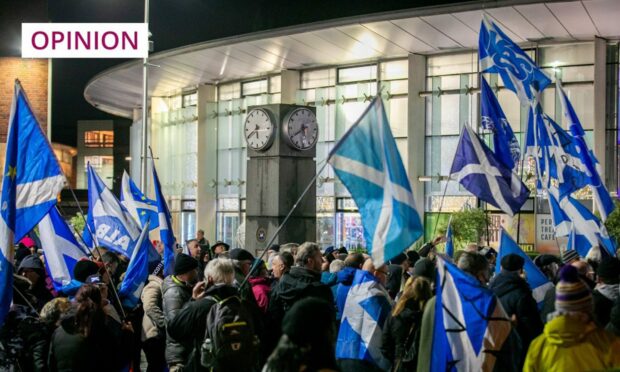One thing there is no shortage of following the general election is advice to SNP leader John Swinney on what went wrong for the party and, from some at least, how best to fix it.
Let’s be clear from the start though.
The vast bulk of commentary, punditry and analysis purporting to pinpoint the causes and solutions does not come from a place with the SNP’s or the first minister’s best interests in mind.
For the most part, if it is not emanating from those who can barely conceal their glee at the party’s loss of three dozen-plus seats last Thursday, it is coming from those with axes to grind so heavy they can barely lift them.
The litany of reasons goes something like this: “It’s all Nicola Sturgeon’s fault,”; “It’s all about the gender issue”; “you talked about independence too much”; “you didn’t talk about independence enough”; “you haven’t dualled the whole of the A9,” and on it goes.
The simple truth is that incumbency comes at a cost.
And while the SNP’s repeated landslides at Holyrood and Westminster have for years defied the predictions and hopes from some that political gravity would at some point start reasserting itself, a setback like this was always possible.
All is far from lost, however, both for the party’s hopes of remaining in power in Scotland and for the cause of independence.
‘Don’t downplay disappointment’
In the immediate term, there needs to be renewed focus on governing well and on the delivery of core services such as health and education, while dispensing with policy initiatives that are likely to become mired in controversy and drain precious political capital.
John Swinney’s early mission statements as first minister have been in keeping with that strategy, and he should be given time and space to pursue such an agenda in the less than two years now left until the next Scottish Parliament election.
There should be no attempt by the SNP, publicly or privately, to downplay the disappointment or the scale of the reverse.
But equally, there should be concerted efforts – especially internally – to avoid overinterpreting it or catastrophising.
The fact is the SNP were only a handful of percentage points behind Labour in an election where they faced the ferocious headwinds of a desire for change at UK level.
The Westminster voting system ensured that that relatively small difference in vote share was supercharged in terms of seats differential.
In an increasingly volatile political climate, where large swings between elections are now commonplace, it would take only a small swing to see the party reasserting its dominance at Westminster.
Meanwhile, the SNP remain comfortably the largest party at Holyrood, with Labour trying to overtake them from third place.
IndyRef2 issue
These facts cut no ice at all in terms of public debate, in the face of lurid post-election headlines, but they should nevertheless provide essential context to help bring perspective for internal purposes as the party attempts to reset.
The other significant factor in the SNP’s favour is the fact that support for independence remains at historically high and sustained levels in opinion polls.
However, that fact is also not without jeopardy for the party.
Because if you ask people in an opinion poll just now whether they’d like independence, roughly half will say they do. But that only tells part of the story.
The problem for the SNP is that, as much as those people would like independence in an ideal world, they currently see no imminent way of delivering it, regardless of how they vote.
Such has been the effect of Westminster’s blocking tactics in the face of successive pro-independence, pro-referendum electoral landslides and democratic mandates – at Holyrood and Westminster.
That has led, in last week’s election, to a significant decoupling of the SNP and the Yes vote.
‘Strategic mistake’
There may now, in the wake of the result, be a desire to dial down on independence and throw it even further back on the back burner.
On one level that might be understandable and, superficially, have a certain logic to it.
But it would be a strategic mistake, because it would likely only accelerate that decoupling.
Instead, the party should – while acknowledging that a referendum is not imminent – continue to stake out the distinctive pro-independence ground it has made its own, and aim to ensure independence is not seen as an abstract concept or optional extra, but rather as something directly relevant to issues affecting people’s lives, such as the cost-of-living crisis.
With a UK Labour Government under Keir Starmer wedded to Tory spending plans and fully embracing Brexit, there will be ample opportunity to make the case for the independence alternative.
Right now, neither Labour nor the SNP should make any assumptions about how the 2026 Holyrood election will pan out.
But, with half the country already signed up to independence, the SNP, if it enthuses and engages those voters, still has the potential for resounding electoral success.
Stuart Nicolson is a former political journalist and ex-adviser to Nicola Sturgeon and Alex Salmond.












Conversation